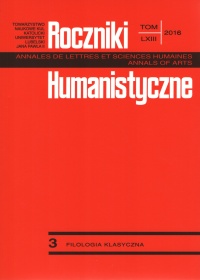Letters of Marcus Caelius Rufus about ‘the perfect revenge’ (Cic. Fam. 8, 12-17)
Abstract
Epistulae ad Familiares contains not only letters written by the great orator to his friends and familiars but also received correspondence. There are seventeen letters written by Marcus Caelius Rufus – the pupil and friend of Cicero – in sixteen books of epistulae. Caelius was writing his letters in the period of three years from 51 till 48 BC when Cicero was, among others, a governor in Cilicia, in Asia. The pupil and active politician was giving information to his older colleague about Roman politics and an activity of society. Caelius did not hesitate to relate to ordinary gossips.
This paper concentrates on one of the subjects mentioned in Caelius’ letters – his problems with hostility of Appius Claudius Pulcher, the well-known Roman politician. Publius Cornelius Dolabella, future Cicero’s son-in-law, accused Appius of vis. Caelius, who wanted to borrow money from Appius, tried to involve Cicero in Claudius’ defense. The young politician thought that Appius would give him money in token of gratitude. It appeared soon that Caelius did not only receive loan, but also enabled Appius to get a revenge against him. The patrician hated Cicero’s pupil for his prior activity (a discredit of Clodia Metelli, the sister of Appius, an advancement of Titus Annius Milo – the murderer od Appius’ brother – Publius Clodius and a detriment of Lucius Domitius Ahenobarbus – the friend of Appius). Te patrician accused Caelius of immoral behaviour. The Cicero’s pupil avoided accusation only because he was an aedile in this time. In the next year, Caelius, as a private man, had to look for protection in Caius Iulius Caesar camp. Caesar was an enemy of optimates, a party of Appius, Cicero and until quite lately – Caelius. This decision of young politician showed his opportunism and conformity and lead to his death in the next year.
References
Asconius Pedianus Quintus: Orationum Ciceronis quinque enarratio, red. A. Kiessling et R. Schoell, Berolini 1875.
Cicero M.T.: Epistulae ad Familiares, ed. D.R. Shackleton-Bailey, vol. I 62-47 B.C., Cambridge 2004.
Ciceronis M. Tulli: Pro M. Caelio oratio, ed. Richard G. Austin, third edition, Oxford 1960.
Clauss J.J.: The Ignoble Consistency of M. Caelius Rufus, „Atheneum” 78(1990), s. 531-540.
Craig W.: Roman Homosexuality: Ideologies of Masculinity in Classical Antiquity, Oxford 1999.
Epstein D.F.: Personal Enmity in Roman Politics 218-43, London, New York, Sydney, 1977.
Gruen E.S.: The Last Generation of the Roman Republic, Berkeley 1974.
Jackson S.B.: Marcus Caelius Rufus, „Hermathena” 126(1979), s. 55-67.
Korpanty J.: Rzeczpospolita potomków Romulusa, Warszawa 1979.
Odgers M.M.: Marcus Caelius Rufus, „The Classical Weekly” 23(1930), nr 21, s.161- 166.
Pianko G.: Korespondenci Cycerona, Marek Celiusz Rufus, „Meander” 17(1962), nr 4, s.179-191.
Rosivach V.J.: Caelius’ Adherence to the Caesarian Cause, „The Classical World” 74(1980-81), nr 4, s. 201-212.
Syme R.: Rewolucja rzymska, przeł. Anna M. Baziór, Poznań 2009.
Tatum W.J.: The Patrician Tribune. Plublius Clodius Pulcher, Chapel Hill and London 1999.
Wellejusz Paterkulus: Historia rzymska, przekład, wstęp i komentarz Edward Zwolski, Wrocław 2006.
Copyright (c) 2016 Roczniki Humanistyczne

This work is licensed under a Creative Commons Attribution-NonCommercial-NoDerivatives 4.0 International License.





